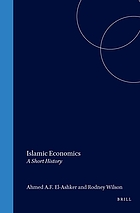 Islam and Trade in Sierra Leone
by
Alusine Jalloh (Editor); David E. Skinner (Editor)
Islam and Trade in Sierra Leone
by
Alusine Jalloh (Editor); David E. Skinner (Editor)
 Islamic Economics: a short history
by
Ahmed Abdel-Fattah El-Ashker; Rodney Wilson
Islamic Economics: a short history
by
Ahmed Abdel-Fattah El-Ashker; Rodney Wilson
